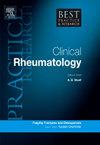探索遗传学对系统性红斑狼疮临床表现的影响。
IF 4.8
2区 医学
Q1 RHEUMATOLOGY
Best Practice & Research in Clinical Rheumatology
Pub Date : 2024-12-01
DOI:10.1016/j.berh.2024.101971
引用次数: 0
摘要
系统性红斑狼疮(SLE)是一种复杂的自身免疫性疾病,其特点是临床表现多种多样,影响多个器官和系统。近年来,人们对系统性红斑狼疮各种表现的遗传因素的认识有了长足的进步。本综述概述了系统性红斑狼疮一些最常见表现的遗传影响,包括肾脏受累、神经精神、皮肤、体质、肌肉骨骼和心血管表现。我们讨论了有关这些表现的遗传基础的知识现状,强调了与这些表现的发病机制有关的关键遗传变异和途径。此外,我们还探讨了遗传发现的临床意义,包括它们在系统性红斑狼疮患者的风险分层、预后和个性化治疗方法中的潜在作用。本综述旨在通过对系统性红斑狼疮表现的遗传情况进行全面研究,深入了解驱动疾病异质性的潜在机制,并为该领域未来的研究方向提供参考。本文章由计算机程序翻译,如有差异,请以英文原文为准。
Exploring the contribution of genetics on the clinical manifestations of systemic lupus erythematosus
Systemic lupus erythematosus (SLE) is a complex autoimmune disease characterized by diverse clinical manifestations affecting multiple organs and systems. The understanding of genetic factors underlying the various manifestations of SLE has evolved considerably in recent years. This review provides an overview of the genetic implications in some of the most prevalent manifestations of SLE, including renal involvement, neuropsychiatric, cutaneous, constitutional, musculoskeletal, and cardiovascular manifestations. We discuss the current state of knowledge regarding the genetic basis of these manifestations, highlighting key genetic variants and pathways implicated in their pathogenesis. Additionally, we explore the clinical implications of genetic findings, including their potential role in risk stratification, prognosis, and personalized treatment approaches for patients with SLE. Through a comprehensive examination of the genetic landscape of SLE manifestations, this review aims to provide insights into the underlying mechanisms driving disease heterogeneity and inform future research directions in this field.
求助全文
通过发布文献求助,成功后即可免费获取论文全文。
去求助
来源期刊
CiteScore
9.40
自引率
0.00%
发文量
43
审稿时长
27 days
期刊介绍:
Evidence-based updates of best clinical practice across the spectrum of musculoskeletal conditions.
Best Practice & Research: Clinical Rheumatology keeps the clinician or trainee informed of the latest developments and current recommended practice in the rapidly advancing fields of musculoskeletal conditions and science.
The series provides a continuous update of current clinical practice. It is a topical serial publication that covers the spectrum of musculoskeletal conditions in a 4-year cycle. Each topic-based issue contains around 200 pages of practical, evidence-based review articles, which integrate the results from the latest original research with current clinical practice and thinking to provide a continuous update.
Each issue follows a problem-orientated approach that focuses on the key questions to be addressed, clearly defining what is known and not known. The review articles seek to address the clinical issues of diagnosis, treatment and patient management. Management is described in practical terms so that it can be applied to the individual patient. The serial is aimed at the physician in both practice and training.

 求助内容:
求助内容: 应助结果提醒方式:
应助结果提醒方式:


